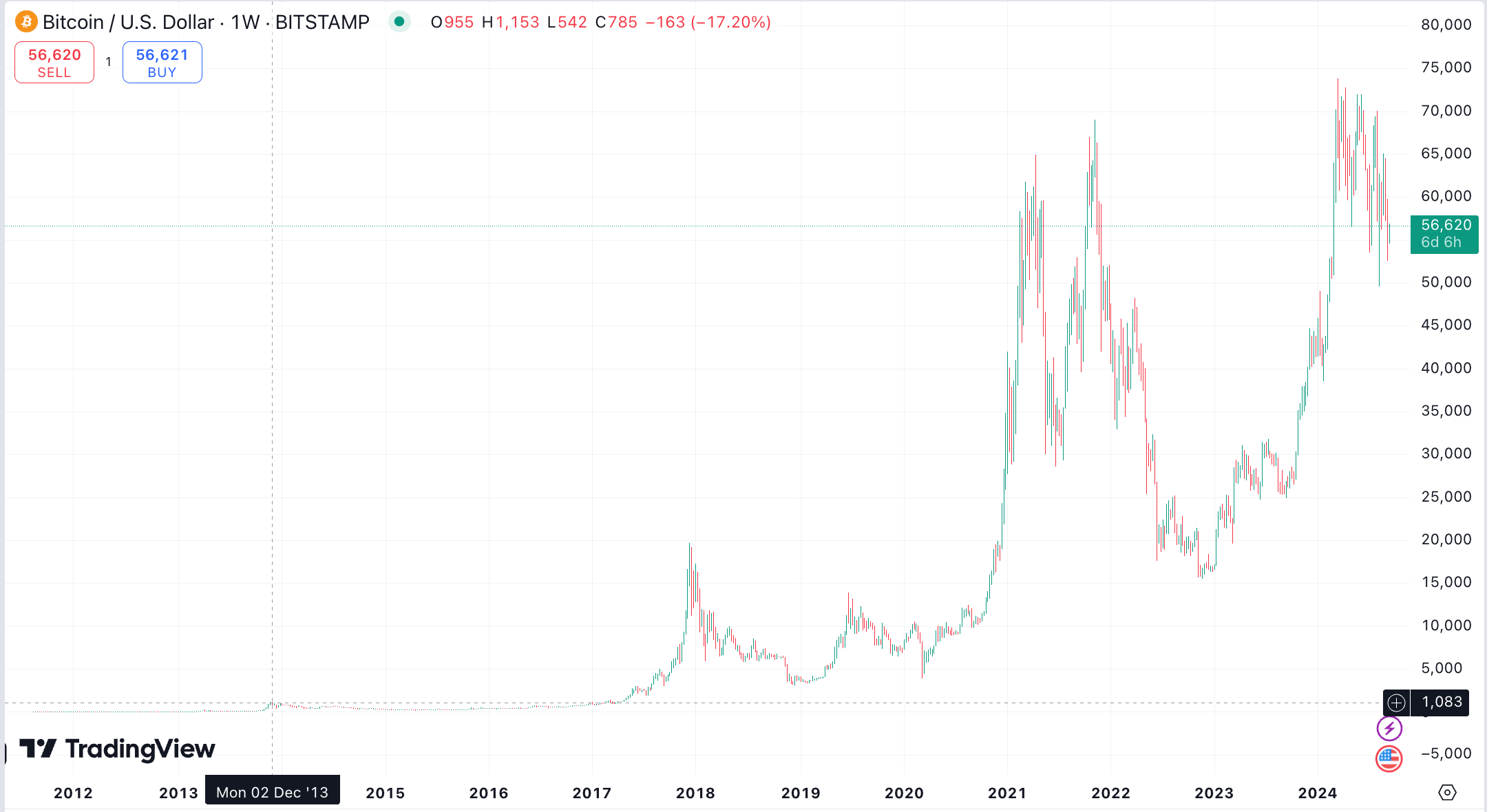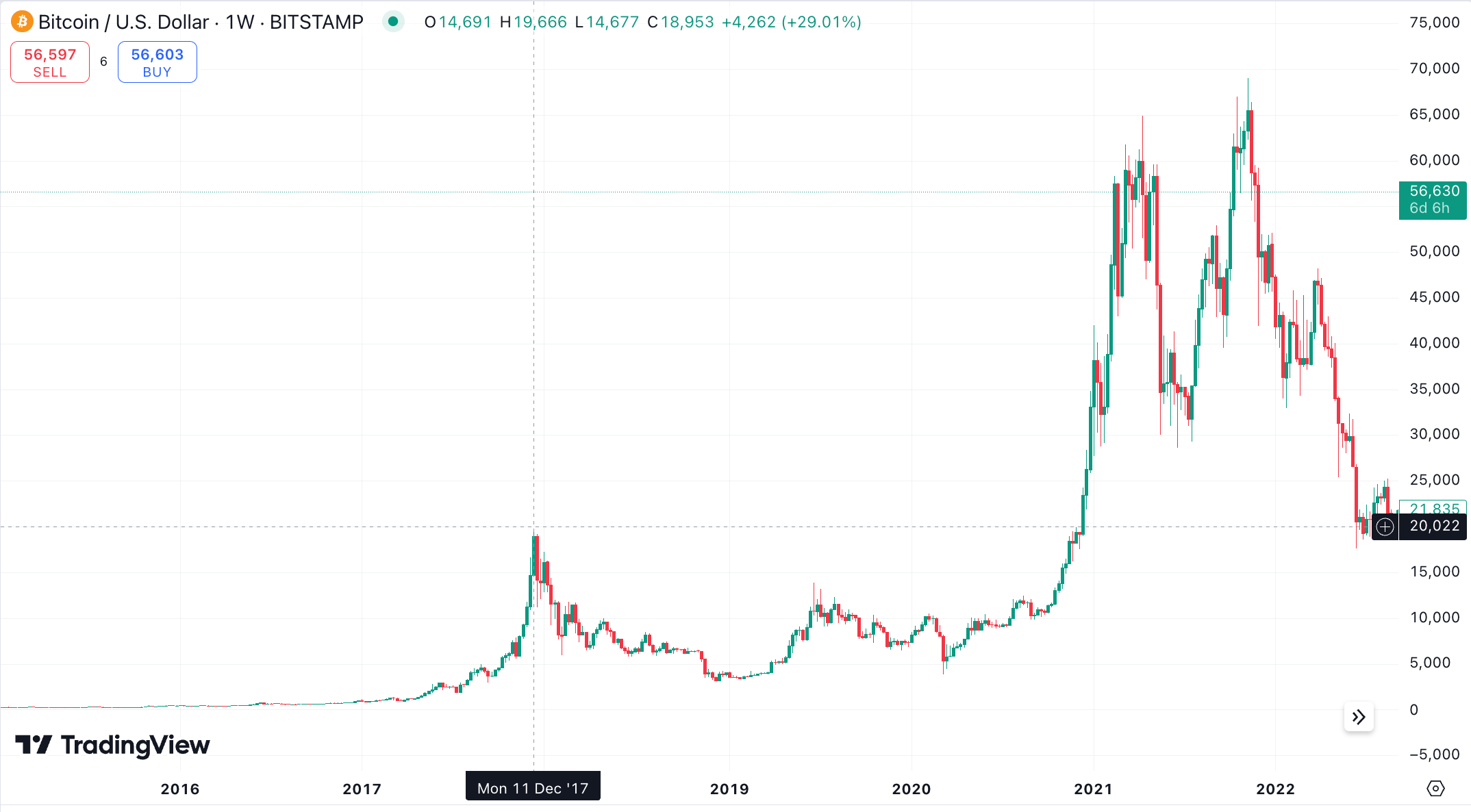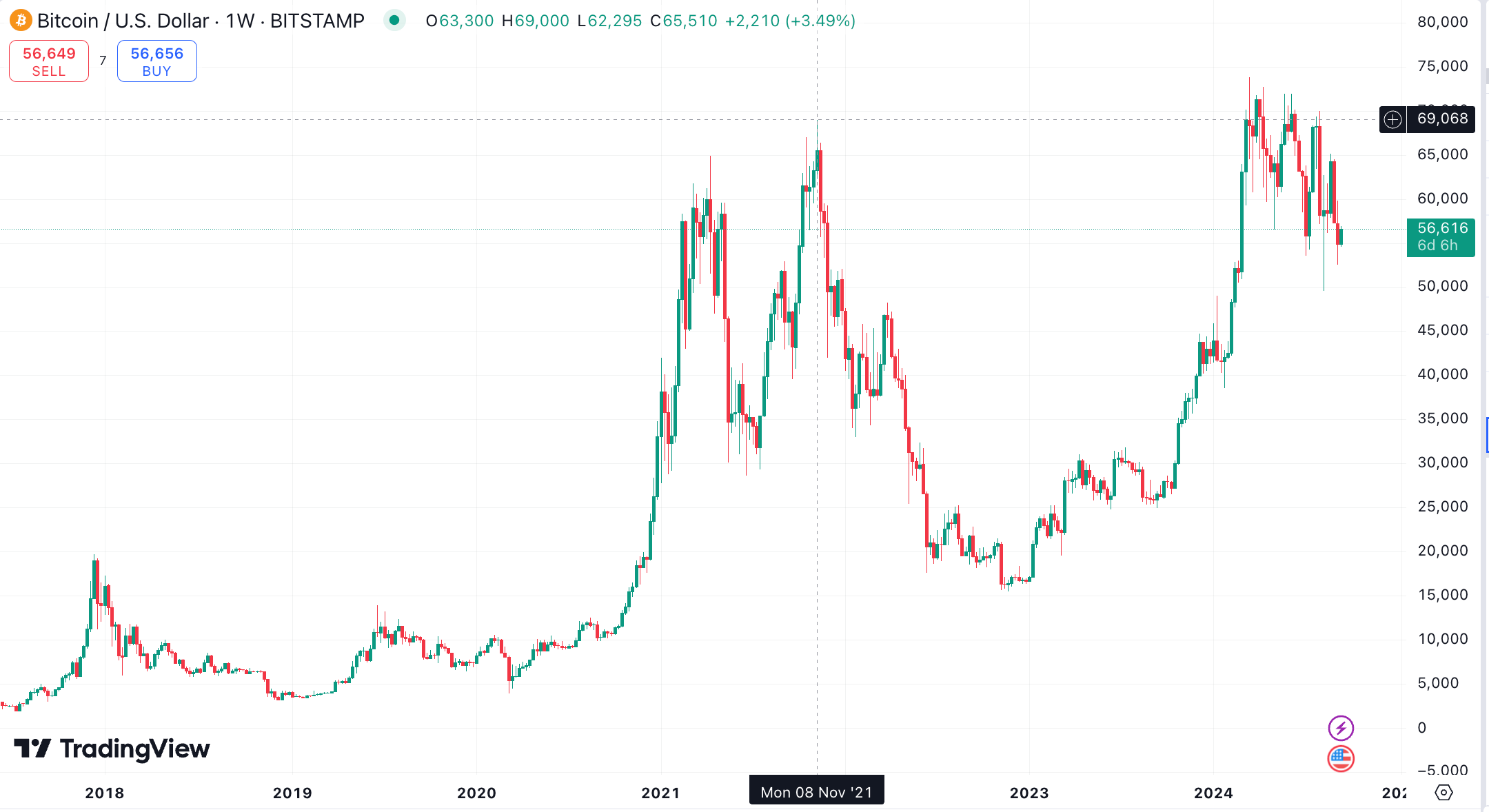Bitcoin, the world’s first and most popular Cryptocurrency, has always been a topic of great interest and speculation. Over the years, the price of Bitcoin has experienced significant volatility, leading many to wonder what the future holds for this digital asset.
As we approach the end of 2024, traders, investors, and analysts are closely monitoring various factors that may influence Bitcoin’s price in the coming years. Will Bitcoin rise once again, or will the Crypto market continue to face challenges?
In this article, we provide a detailed Bitcoin (BTC) price prediction for 2024 and beyond. Examine the key factors that influence its value and consider expert opinions on its future.
Bitcoin Overview
Today (26 February 2026) Bitcoin (BTC/USD) is trading at $93685.6 per BTC, with a market cap of $1860609045921 USD. The 24-hour trading volume amounts to $57695433551 USD. BTC to USD price has changed by 0.3% in the last 24 hours. Bitcoin’s circulating supply is 19855012 BTC.
Bitcoin Price Prediction for September 2024: Impact of US Inflation Data
The upcoming US inflation data (CPI) is expected to ease to 2.6% in August from 2.9%, ahead of the Federal Reserve’s monetary policy meeting. Depending on the CPI results, the Fed may cut interest rates by 25 or 50 basis points. A lower inflation figure could lead to increased liquidity, benefiting risk assets like Bitcoin and pushing its price toward $60,000. However, too-low inflation could revive recession fears, negatively impacting Bitcoin, while unexpectedly high inflation may trigger a sell-off.
Kathryn Davies
PrimeXBT Market Analyst
Bitcoin price prediction for 2024
The year 2024 is expected to be pivotal for Bitcoin due to various events and regulatory advancements. One of the key factors that influence predictions for 2024 is the Halving event and approval of Bitcoin spot ETFs in major markets.
Spot ETFs and institutional investments
After Bitcoin spot ETF approval, massive institutional investments into Bitcoin have increased its price. Institutional participation in financial products like ETFs could raise Bitcoin’s legitimacy and market value in the long run and potentially lead to a bullish breakout at the end of 2024. As institutional investors flock to buy Bitcoin, the demand for BTC rises, impacting the price of Bitcoin positively.
US elections and regulatory shifts
Another factor to watch is the outcome of the U.S. elections, which could impact regulatory policies for Cryptocurrencies. Governments are becoming more proactive in legislating the Crypto industry, which could have positive or negative consequences for Bitcoin’s price. Changes in regulations, especially around Bitcoin ETFs, will directly affect price movements in the future.
Global economic conditions and inflation
In 2024, inflation rates, interest rates, and global economic stability will also play significant roles in Bitcoin’s price movement. Investors will likely look to Bitcoin as a safe haven asset if inflation remains high and traditional markets underperform. As Bitcoin miners continue producing new Bitcoins in limited quantities, extra supply-side pressure could drive Bitcoin prices upward.
Analysts predict that the price of Bitcoin could see substantial growth in 2024, with some forecasts suggesting that the coin could reach a new all-time high, influenced by both macroeconomic factors and current sentiment on the market.
Price prediction for 2024:
| Month | Minimum Price ($) | Average Price ($) | Maximum Price ($) |
| September | 57,500 | 64,500 | 72,000 |
| October | 58,500 | 66,000 | 74,000 |
| November | 59,000 | 67,000 | 76,000 |
| December | 60,000 | 69,000 | 78,000 |
Bitcoin price prediction for 2025
In 2025, Bitcoin is expected to continue its upward trend, supported by increasing institutional adoption and favourable regulatory frameworks. Experts predict Bitcoin’s price could fluctuate between $85,000 and $108,000, depending on the global economic environment and key indicators like the relative strength index.
Increasing institutional support and adoption
As institutional adoption rises, Bitcoin could further integrate into traditional financial products. Hedge funds, pension funds, and corporations see Bitcoin as a strategic asset, driving a bullish price forecast for 2025. Growing Bitcoin ETFs and related investment vehicles could also boost Bitcoin’s price prediction.
Global regulations and Bitcoin’s integration into traditional finance
In 2025, more nations may adopt regulatory frameworks impacting Bitcoin. Central Bank Digital Currencies (CBDCs) could compete with Bitcoin, but its decentralized nature might provide an advantage. Bitcoin’s role in traditional finance could significantly influence its future price.
Price prediction for 2025:
| Month | Minimum Price ($) | Average Price ($) | Maximum Price ($) |
| January | 75,000 | 80,000 | 85,000 |
| February | 77,000 | 82,000 | 88,000 |
| March | 79,000 | 84,000 | 90,000 |
| April | 81,000 | 86,000 | 92,000 |
| May | 83,000 | 88,000 | 94,000 |
| June | 85,000 | 90,000 | 96,000 |
| July | 87,000 | 92,000 | 98,000 |
| August | 89,000 | 94,000 | 100,000 |
| September | 91,000 | 96,000 | 102,000 |
| October | 93,000 | 98,000 | 104,000 |
| November | 95,000 | 100,000 | 106,000 |
| December | 97,000 | 102,000 | 108,000 |
Bitcoin price prediction for 2026
In 2026, the price of Bitcoin could rise, driven by mainstream adoption and blockchain advancements. However, predictions remain uncertain due to Cryptocurrency volatility and fluctuations in the market sentiment.
Blockchain technology and security improvements
Technological improvements like the Lightning Network and second-layer solutions could enhance Bitcoin’s speed and reduce fees. These advancements will drive adoption, potentially increasing the price of Bitcoin by making it a trusted financial asset.
Volatility and market speculation
Bitcoin’s volatility may persist in 2026. Traders should be cautious, as price action can shift rapidly. Despite potential corrections, analysts expect Bitcoin’s price to rise due to bullish market sentiment and volatility-driven speculation.
Price prediction for 2026:
| Month | Minimum Price ($) | Average Price ($) | Maximum Price ($) |
| January | 100,000 | 110,000 | 120,000 |
| February | 105,000 | 115,000 | 125,000 |
| March | 110,000 | 120,000 | 130,000 |
| April | 115,000 | 125,000 | 135,000 |
| May | 120,000 | 130,000 | 140,000 |
| June | 125,000 | 135,000 | 145,000 |
| July | 130,000 | 140,000 | 150,000 |
| August | 135,000 | 145,000 | 155,000 |
| September | 140,000 | 150,000 | 160,000 |
| October | 145,000 | 155,000 | 165,000 |
| November | 150,000 | 160,000 | 170,000 |
| December | 155,000 | 165,000 | 175,000 |
Bitcoin price prediction for 2027
By 2027, Bitcoin could become a mainstream asset, with widespread adoption across various sectors. Price predictions suggest steady growth, but regulatory changes and market fluctuations could impact Bitcoin’s value.
Bitcoin in global commerce
By 2027, Bitcoin might play a more integral role in global commerce, with major corporations accepting Bitcoin as a payment method. This growing demand and Bitcoin’s market cap growth could lead to price increases reflecting Bitcoin’s rising utility.
Governments and central banks’ approach towards Bitcoin
Government and central bank decisions will shape Bitcoin’s future. High-inflation countries may adopt Bitcoin as legal tender, while others could impose restrictions. Bitcoin’s decentralized nature will likely sustain its demand and bullish price forecast for 2027.
Price prediction for 2027:
| Month | Minimum Price ($) | Average Price ($) | Maximum Price ($) |
| January | 160,000 | 170,000 | 180,000 |
| February | 165,000 | 175,000 | 185,000 |
| March | 170,000 | 180,000 | 190,000 |
| April | 175,000 | 185,000 | 195,000 |
| May | 180,000 | 190,000 | 200,000 |
| June | 185,000 | 195,000 | 205,000 |
| July | 190,000 | 200,000 | 210,000 |
| August | 195,000 | 205,000 | 215,000 |
| September | 200,000 | 210,000 | 220,000 |
| October | 205,000 | 215,000 | 225,000 |
| November | 210,000 | 220,000 | 230,000 |
| December | 215,000 | 225,000 | 235,000 |
Bitcoin price prediction for 2028
In 2028, Bitcoin is expected to continue its upward trajectory, supported by global acceptance and financial integration. Analysts predict Bitcoin could surpass its all-time highs as it becomes further integrated into global finance.
Integration with centralized financial systems
By 2028, Bitcoin’s integration with centralized financial systems could expand. Institutional interest, driven by Bitcoin ETFs and related products, will likely grow, contributing to Bitcoin’s market cap and increased prices.
Adoption by emerging markets
Emerging markets with unstable currencies are likely to adopt Bitcoin as a hedge against hyperinflation. This trend could significantly increase Bitcoin’s demand and value, pushing its price even higher by 2028.
Price prediction for 2028:
| Year | Minimum Price ($) | Average Price ($) | Maximum Price ($) |
| January | 220,000 | 230,000 | 240,000 |
| February | 225,000 | 235,000 | 245,000 |
| March | 230,000 | 240,000 | 250,000 |
| April | 235,000 | 245,000 | 255,000 |
| May | 240,000 | 250,000 | 260,000 |
| June | 245,000 | 255,000 | 265,000 |
| July | 250,000 | 260,000 | 270,000 |
| August | 255,000 | 265,000 | 275,000 |
| September | 260,000 | 270,000 | 280,000 |
| October | 265,000 | 275,000 | 285,000 |
| November | 270,000 | 280,000 | 290,000 |
| December | 275,000 | 285,000 | 295,000 |
Long-term BTC price prediction to 2030 – 2050
Long-term Bitcoin price forecast could be very unpredictable, but many experts believe that Bitcoin could continue to gain value over the next few decades, potentially reaching unprecedented levels.
Bitcoin as a global reserve asset
Some experts foresee Bitcoin becoming a global reserve asset by 2050, competing with traditional reserve currencies like the U.S. dollar. As Bitcoin gains wider recognition as a store of value, the price of Bitcoin could increase substantially over the next several decades.
Technological and economic evolution
The next five to ten years could see Bitcoin reaching new milestones, driven by factors such as increased institutional investment, advancements in blockchain technology, and widespread adoption as a digital asset. It’s possible that Bitcoin could surpass traditional financial systems in terms of efficiency and trust, contributing to its long-term price appreciation.
Price prediction until 2050:
| Year | Minimum Price ($) | Average Price ($) | Maximum Price ($) |
| 2029 | 280,000 | 300,000 | 320,000 |
| 2030 | 350,000 | 380,000 | 400,000 |
| 2040 | 500,000 | 600,000 | 1,000,000 |
| 2050 | 1,000,000 | 5,000,000 | 10,000,000 |
What Crypto experts predict for Bitcoin’s price
The future of Bitcoin continues to be a topic of debate among experts. Here are some key Bitcoin price predictions from industry leaders.
Cathie Wood’s $1 million forecast
Cathie Wood, CEO of ARK Invest, predicts that Bitcoin could reach $1 million by 2030, driven by institutional adoption and its potential as a hedge against inflation. Wood highlights Bitcoin’s finite supply and increasing demand from institutional investors as key factors in her bullish prediction.
Mike Novogratz’s $500,000 prediction by 2027
Mike Novogratz, CEO of Galaxy Digital, believes that Bitcoin could reach $500,000 by 2027, especially with continued adoption by large financial institutions. Novogratz emphasizes Bitcoin’s role as a diversification tool in institutional portfolios and the growing influence of Bitcoin ETFs on the Crypto market.
Anthony Pompliano’s bold $250,000 Bitcoin prediction by 2025
Anthony Pompliano, Co-founder of Morgan Creek Digital, suggests that Bitcoin could hit $250,000 by 2025, driven by a combination of increasing demand and Bitcoin’s fixed supply of 21 million coins. He argues that Bitcoin’s scarcity will play a crucial role in its price appreciation, as more investors – retail and institutional – realize its value as a digital store of wealth.
Pompliano also believes that macroeconomic factors such as inflation and the depreciation of traditional currencies will further boost demand for Bitcoin, positioning it as a hedge against traditional financial systems.
Tom Lee’s forecast of Bitcoin reaching $200,000
Tom Lee, Co-founder of Fundstrat Global Advisors, has forecasted that Bitcoin could rise to $200,000 in the short-term. He indicates the impact of macroeconomic trends and growing institutional interest as key drivers. Lee emphasizes the role of inflationary pressures, increased government spending, and the weakening of traditional currencies as contributing factors to Bitcoin’s appeal.
Moreover, the involvement of large financial institutions and corporations in the Bitcoin space adds credibility to his prediction, as these entities continue to allocate more capital into Cryptocurrency markets as part of a diversification strategy.
Tim Draper’s optimistic $250,000 prediction for Bitcoin by 2024
Tim Draper, a well-known Venture Capitalist, remains optimistic that Bitcoin could reach $250,000 by 2025, pointing to the growing adoption of Bitcoin by both retailers and consumers. Draper has long argued that Bitcoin’s decentralized nature and potential to disrupt traditional banking systems will lead to greater adoption across various industries.
He also notes the increasing number of merchants accepting Bitcoin payments. This factor could further accelerate Bitcoin’s integration into daily financial transactions and, in turn, drive its price upward.
Max Keiser’s vision of Bitcoin reaching $400,000 in the next five years
Max Keiser, a prominent Financial Analyst and host of the “Keiser Report,” envisions Bitcoin reaching $400,000 within the next five years. Keiser believes that as more individuals and institutions seek alternatives to fiat currencies and gold, Bitcoin’s appeal will grow due to its deflationary nature and decentralized structure.
He argues that Bitcoin’s long-term value proposition lies in its ability to protect wealth from inflation, government intervention, and traditional market volatility. Together these factors can make it an increasingly attractive asset for global investors.
PlanB’s $288,000 Bitcoin target based on the Stock-to-Flow model
PlanB, the creator of the Stock-to-Flow Model, predicts that Bitcoin could hit $288,000 by 2024. PlanB’s forecast is based on a quantitative model that tracks Bitcoin’s historical price patterns relative to its scarcity.
The Stock-to-Flow Model, which divides Bitcoin’s existing supply by the annual production rate, has accurately predicted past price surges following Bitcoin Halving events. PlanB believes that the 2024 Bitcoin Halving event will further restrict the supply of newly mined coins. Potentially this could trigger another bull run as demand continues to grow, pushing Bitcoin towards his target price.
What factors affect Bitcoin’s price?
Price of Bitcoin is influenced by a variety of factors, including market demand, regulatory developments, and global economic conditions. Let’s break down these elements further to understand their impact on Bitcoin’s price movements.
Market demand and supply dynamics
One of the most significant factors affecting the price of Bitcoin is the basic economic principle of supply and demand. With Bitcoin’s total supply capped at 21 million coins, any increase in demand directly impacts its price. As more people and institutions begin to buy and hold Bitcoin, the scarcity of available coins drives prices higher.
- Halving events and supply shock: Bitcoin halving events, which occur approximately every four years, reduce the block reward for miners by half. This effectively slows down the rate at which new Bitcoins enter circulation, creating a supply shock that typically leads to price increases. These events generate bullish volatility, often triggering a positive trend in the chart.
- FOMO (Fear of Missing Out): Another driver of demand is market sentiment, specifically FOMO. When investors see a quickly rising price, they often rush to buy in hopes of earning on further gains, which can amplify price movements.
Regulatory environment and government policies
Government policies and regulations, especially those related to Cryptocurrency trading, taxation, and legality, play a significant role in shaping Bitcoin’s price. Both the approval of Bitcoin ETFs and regulatory decisions by legal bodies like the U.S. Securities and Exchange Commission (SEC) can have a profound impact on Bitcoin’s market cap.
- Positive regulatory moves: Favourable regulatory moves, such as the approval of Bitcoin spot ETFs, provide Bitcoin with institutional legitimacy and can result in price increases by attracting more investors.
- Negative regulatory impacts: Conversely, regulatory crackdowns, bans on Bitcoin trading, or heightened taxation policies can lead to decreased demand and cause Bitcoin’s price to drop. In countries like China, Bitcoin mining bans had a short-term negative impact on the price of Bitcoin, though the market later adjusted.
Institutional adoption and market sentiment
As Bitcoin gains institutional acceptance, its demand will likely rise further. Many financial institutions are adding Bitcoin to their portfolios, and with every new adoption, the market’s perception of Bitcoin shifts from a speculative asset to a more stable, long-term investment option.
- Hedge funds and corporations: Major corporations like Tesla and hedge funds are holding Bitcoin on their balance sheets as a store of value.This rising trend in corporate adoption could have a lasting positive impact on Bitcoin’s value and increase the average price of Bitcoin in the future.
- Media influence on market sentiment: News coverage, both positive and negative, heavily influences Bitcoin’s market sentiment.A sudden surge of positive news can lead to rapid buying, while negative reports, such as security breaches or governmental crackdowns, can cause mass sell-offs. This dynamic highlights the importance of keeping track of Bitcoin’s price action and market participants’ behaviour.
Technological developments
Technological developments within the Cryptocurrency space, such as scalability solutions, security enhancements, and the introduction of new financial products, are other key factors that influence price of Bitcoin.
- The role of Lightning network: The Lightning Network, a second-layer solution for Bitcoin, allows faster and cheaper transactions, making Bitcoin more usable for everyday transactions. As more users and merchants adopt the Lightning Network, Bitcoin’s utility and adoption are expected to rise, positively impacting its price.
- Blockchain enhancements and security upgrades: Improvements to Bitcoin’s underlying blockchain technology also play a crucial role. Better scalability, increased security, and privacy enhancements attract more users and drive up the price of Bitcoin.
Global economic conditions
Economic events such as inflation, currency devaluation, and financial crises can lead to increased demand for Bitcoin as a hedge against traditional financial systems.
- Bitcoin as a hedge against inflation: In countries experiencing high inflation, Bitcoin is becoming an alternative to traditional currencies. As inflation erodes the value of traditional currencies, more investors turn to Bitcoin to preserve their wealth.This trend has been particularly evident in countries with volatile economies, such as Venezuela and Argentina.
- Recessions and global economic uncertainty: During times of economic recession, Bitcoin may serve as a “safe haven” asset, similar to gold. If traditional financial markets face instability, Bitcoin’s appeal as a decentralized asset could increase, leading to a rise in its price.Investors may also focus on Bitcoin’s market capitalization and trading volume as indicators of its strength relative to other digital assets.
Bitcoin price history and key milestones
Bitcoin has undergone significant price fluctuations since its inception. Understanding its historical milestones helps provide context for current and future predictions.
Bitcoin’s early days and the famous pizza transaction
In 2010, Bitcoin was still a relatively unknown digital asset. However, one event in May 2010 became iconic in Bitcoin history – when a developer bought two pizzas for 10,000 BTC, marking the first real-world transaction using Bitcoin.
At that time, 10,000 BTC was worth only about $40. As of today, that amount of Bitcoin would be worth hundreds of millions of dollars. This reflects the asset’s exponential growth and its rise to the status of the world’s largest Cryptocurrency.
Bitcoin’s rise to $1,000
By 2013, Bitcoin had gained significant media attention, and its price surged to $1,000 for the first time.

This milestone was a pivotal moment that marked Bitcoin’s transition from a niche internet currency to a mainstream financial asset.
It also attracted the attention of early investors and traders, further driving the price upward.
The 2017 bull run and Bitcoin’s first all-time high
In late 2017, Bitcoin reached nearly $20,000, fuelled by the ICO (Initial Coin Offering) craze and growing retail interest.

The swift rise in price attracted new investors, although it was followed by a sharp correction that led Bitcoin’s price to a drop back to around $3,000 in early 2018.
Bitcoin’s surge during the COVID-19 pandemic
During the COVID-19 pandemic, the price of Bitcoin skyrocketed as investors looked for alternative assets amidst global economic uncertainty.

Bitcoin reached an all-time high of $69,000 in November 2021, driven by increasing institutional investment, the rise of Bitcoin futures ETFs, and heightened interest from retail investors.
Bitcoin’s volatility and the impact of market cycles
Bitcoin’s history is marked by periods of rapid price increases followed by corrections. These market cycles are often referred to as “bull” and “bear” markets. Understanding these cycles can help investors navigate the volatility associated with Bitcoin, allowing them to make informed investment decisions.
What gives Bitcoin its value?
Bitcoin derives its value from several core factors, each of which contributes to its status as the world’s leading Cryptocurrency.
Scarcity and deflationary nature
Bitcoin’s supply is limited to 21 million coins, making it a deflationary asset. Unlike traditional currencies, which can be printed in unlimited quantities, Bitcoin’s finite supply creates scarcity, which helps drive its value. As demand for Bitcoin increases, its scarcity becomes a crucial factor in price appreciation. Bitcoin’s limited supply and the cyclical nature of Halving events contribute to its appeal as a store of value.
Utility as a digital asset
Bitcoin’s utility extends beyond being a speculative asset. It serves multiple purposes, from facilitating peer-to-peer transactions to being used for remittances and cross-border payments. Bitcoin’s decentralized and secure nature makes it appealing for use cases where traditional financial systems may be unreliable. This widespread utility further bolsters Bitcoin’s price predictions.
Widespread adoption
The increasing acceptance of Bitcoin by merchants, financial institutions, and even governments adds to its value. As Bitcoin becomes more integrated into traditional financial systems and more widely used for transactions, its value is likely to increase. Many Crypto enthusiasts believe that the price of Bitcoin will continue to rise as its adoption expands across the globe.
Security and decentralization
The decentralized Bitcoin network ensures that no single entity can control or manipulate the system. Its underlying technology provides security against fraud and tampering, which increases investor’s confidence. This security, combined with decentralization, differentiates Bitcoin from traditional assets and fiat currencies, making it a top choice among investors.
Is Bitcoin a good investment?
Bitcoin remains a highly attractive investment option for many, but it’s important to weigh both the potential rewards and risks involved.
Potential for high returns
Bitcoin has historically delivered significant returns for long-term holders, particularly during bull markets. As institutional interest grows and adoption increases, Bitcoin’s price could continue to appreciate. However, Crypto investors should be aware of the risks associated with volatile assets like Bitcoin.
Risks of volatility and market uncertainty
Despite its potential, Bitcoin is also known for its volatility. Price fluctuations can be extreme, with significant drops occurring in short periods. Investors need to be prepared for this volatility and approach Bitcoin with a long-term investment strategy. Factors such as market sentiment, regulatory authority decisions, and macroeconomic shifts can all impact the price of Bitcoin.
Investing the smart way
At PrimeXBT we offer our users a wide range of Bitcoin investment products with access to the markets in a safe environment. Our products are designed to cater to various trading strategies, and are suitable for both experienced and novice traders.
Whether you’re looking to buy, hold, trade Bitcoin in volatile markets, or invest in Bitcoin-based financial instruments, PrimeXBT provides the tools to help you succeed.
Conclusion: Will Bitcoin rise again?
Predicting whether Bitcoin will rise again requires considering a variety of factors, including market trends, economic conditions, and technological developments. Historically, Bitcoin has demonstrated resilience through both bull and bear markets, often rebounding after significant price corrections.
Many analysts believe that Bitcoin’s fundamentals – limited supply, increasing institutional adoption, and its status as a hedge against inflation – position it for potential long-term growth.
However, Bitcoin’s price can be volatile in the short term, influenced by factors like regulatory decisions, market sentiment, and macroeconomic shifts.
While it’s impossible to predict future prices with certainty, the overall outlook remains cautiously optimistic. Investors should remain aware of both the opportunities and risks involved with Bitcoin as an investment asset.
Will Bitcoin ever go back up?
Historically, Bitcoin has recovered from downturns and has continued to rise over time. Many experts believe that Bitcoin will regain value in the long term, though short-term volatility is expected. Investors should conduct their own research before making an investment decision.
How much is BTC expected to rise?
Estimates vary, but some experts predict Bitcoin could rise to $100,000 or more in the coming years. Factors like institutional adoption, technological advancements, and global economic conditions will play a key role in its future growth.
How much will Bitcoin be worth in 2025?
Predictions for 2025 vary, with some estimates ranging from $150,000 to $250,000. These predictions depend on market conditions and Bitcoin’s continued adoption. The Bitcoin Halving event in 2024 could have a strong impact on its price trajectory.
What will Bitcoin be worth in 2030?
Some analysts, like Cathie Wood of ARK Invest, believe Bitcoin could reach $1 million by 2030 due to its scarcity and growing use as a store of value and hedge against inflation.
Will BTC hit $1 million?
While reaching $1 million seems unrealistic, some experts believe it is possible, especially if Bitcoin continues to gain institutional support and becomes more widely accepted as a global financial asset. The introduction of Bitcoin ETFs and increased regulatory clarity could further solidify Bitcoin's position as a dominant player in the Crypto world.
The content provided here is for informational purposes only. It is not intended as personal investment advice and does not constitute a solicitation or invitation to engage in any financial transactions, investments, or related activities. Past performance is not a reliable indicator of future results.
The financial products offered by the Company are complex and come with a high risk of losing money rapidly due to leverage. These products may not be suitable for all investors. Before engaging, you should consider whether you understand how these leveraged products work and whether you can afford the high risk of losing your money.
The Company does not accept clients from the Restricted Jurisdictions as indicated in our website/ T&C. Some services or products may not be available in your jurisdiction.
The applicable legal entity and its respective products and services depend on the client’s country of residence and the entity with which the client has established a contractual relationship during registration.




